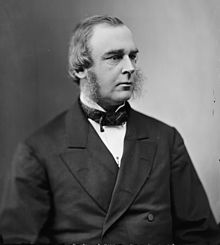George B. Loring
George Bailey Loring (born November 8, 1817 in North Andover , Essex County , Massachusetts , † September 14, 1891 in Salem , Massachusetts) was an American politician . Between 1877 and 1881 he represented the state of Massachusetts in the US House of Representatives .
Career
George Loring attended Franklin Academy in Andover and then taught himself for some time as a teacher. At the same time he studied at Harvard University until 1838 . After a subsequent medical degree at the same university and his license as a doctor in 1842, he began to work for some time in North Andover in this profession. Between 1843 and 1850 he was a doctor at the Naval Hospital in Chelsea . He also served as the medical supervisor of the Seventh Regiment of the Massachusetts State Militia from 1842 to 1844. In 1849 he was tasked with drafting reform plans for the United States Navy hospital system. From 1851 he lived in Salem, where he was a postman from 1853 to 1858 .
Politically, Loring was a member of the Democratic Party before the Civil War . During the war he joined the Republicans . He was a member of the Massachusetts House of Representatives in 1866 and 1867 . Between 1869 and 1876 he was state chairman of the Republican Party in Massachusetts. From 1873 to 1876 he was a member of the Massachusetts Senate , of which he was president. In the years 1868, 1872 and 1876 Loring took part as a delegate from the respective Republican National Conventions , at which Ulysses S. Grant and later Rutherford B. Hayes were nominated as presidential candidates. In 1872 he became federal commissioner for the state of Massachusetts for the planned 100th anniversary of American independence in 1876.
In the congressional election of 1876 , Loring was elected to the United States House of Representatives in Washington, DC in the sixth constituency of Massachusetts , where he succeeded Charles Perkins Thompson on March 4, 1877 . After being re-elected, he was able to complete two terms in Congress until March 3, 1881 . In 1880 he was no longer nominated for re-election by his party. Between 1881 and 1885 Loring was the federal government's agricultural commissioner. In 1889 and 1890 he was the successor to Edward Parke Custis Lewis as the American envoy to Portugal . He died in Salem on September 14, 1891.
Web links
- George B. Loring in the Biographical Directory of the United States Congress (English)
- George B. Loring in the database of Find a Grave (English)
| personal data | |
|---|---|
| SURNAME | Loring, George B. |
| ALTERNATIVE NAMES | Loring, George Bailey (full name) |
| BRIEF DESCRIPTION | American politician |
| DATE OF BIRTH | November 8, 1817 |
| PLACE OF BIRTH | North Andover , Massachusetts |
| DATE OF DEATH | September 14, 1891 |
| Place of death | Salem , Massachusetts |

